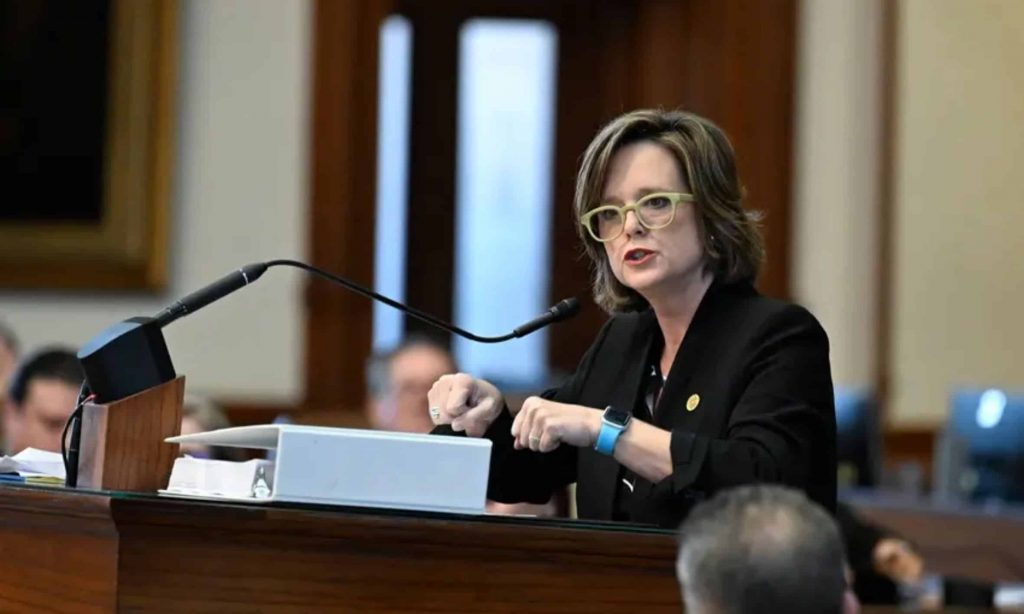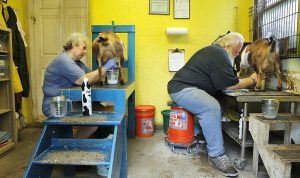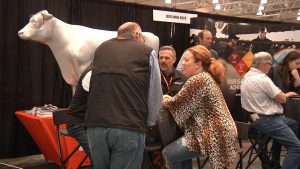
A nefarious kitchen remodel and an extramarital affair. Alleged corruption and threats. God, money and Dairy Queen.
Those were among the many details of now-suspended Texas Attorney General Ken Paxton’s alleged misconduct that were aired on the floor of the Texas House on Saturday ahead of a historic vote to impeach the state government’s top lawyer.
Paxton had faced few political consequences for years for his many public scandals. Allegations against him included taking bribes from a real estate investor, trying to protect that same investor from legal action, abusing the powers of the office and firing staff members who reported his misconduct.
But after Paxton’s office asked lawmakers to use taxpayer dollars to pay a $3.3 million settlement to the whistleblowing staffers, the scandals proved too much for the Donald Trump-backed attorney general to shake off.
“No one person should be above the law,” state Rep. David Spiller, R-Jacksboro, a member of the House Committee on General Investigating, told his House colleagues on Saturday.
“We should not ignore it and pretend it didn’t happen,” he said. “Texas is better than that.”
The impeachment charges centered on Paxton’s entanglement with Nate Paul, an Austin real estate investor whose relationship with Paxton as a friend and political donor had caused several of his staff members to report him to federal authorities and prompted an FBI investigation — which Paxton allegedly refused to help law enforcement with. Paul was fined more than $180,000 and ordered to serve jail time by a state judge after he was found in contempt of court earlier this year.
“All roads lead to Nate Paul,” state Rep. Ann Johnson, a Houston Democrat and vice chair of the investigating committee, told the chamber before outlining Paxton’s yearslong relationship with his friend.
Members of the House committee that investigated Paxton said they believed he broke the law by using the agency to serve the interests of Paul, from whom he allegedly took bribes — including when the real estate developer was sued for fraud.
Eight top deputies from Paxton’s office reported him to federal authorities almost three years ago, alleging he had misused his authority to help Paul with a fraud lawsuit from the Austin nonprofit Roy F. & Joann Cole Mitte Foundation.
Spiller said Saturday that Paxton demonstrated an intense desire to help his friend with the lawsuit against the advice of his deputy attorney general. In return, Paxton allegedly received bribes and favors from Paul — from home remodeling to hiring a woman with whom Paxton had an affair.
In one now-infamous story, Paxton allegedly accepted $20,000 worth of countertop materials from Paul through contractors renovating his home in Austin.
Johnson said they learned of the story after talking to a “young man” who worked at the AG’s office. The employee, Johnson said, once observed Paxton and a contractor discussing a remodel. During the exchange, Johnson said, the contractor said he needed to “talk to Nate” before proceeding with a change to the kitchen countertops.
“This young man is disturbed” by the interaction, Johnson said as she retold the story. “In fact, he is crushed by it. He believes Ken Paxton is one of his heroes.”
The employee eventually turned down a promotion and then quit the office. But he allegedly continued to receive money from Paxton’s campaign for a few months after, Johnson said, implying that the monthly $250 checks were Paxton’s attempt to keep the young man quiet. She said the former staffer called the campaign to tell them to stop sending the money and sent it back.
Earlier in the week, a Paxton aide tried to cast doubt on the investigation by disputing the materials of the countertops involved in the home remodel. Paxton and his supporters also attempted to undermine the report by claiming that the allegations were largely made by “political” appointees — an assertion that House committee members swiftly shot down Saturday.
Committee members also claimed that Paul helped Paxton maintain his affair with a San Antonio woman by giving her a job at Paul’s company in Austin. It made her “more convenient” to Paxton, Johnson said.

Johnson claimed that a distraught Paxton once bemoaned his continued love for the woman he was having an affair with to his staff, who were gravely concerned that it was improper and could open the attorney general’s office to blackmail. Exposure of the affair, Johnson said, would have risked Paxton’s reputation as a “Christian man” who cherishes “family values” with his political base.
“He has an interest in attempting to keep this affair quiet,” Johnson said. “He also has an interest in continuing it.”
The attorney general’s wife, Angela Paxton, is a state senator. She learned of the affair four years ago, causing the couple to go on a brief break, according to testimony from the lead counsel for the investigating committee, Erin Epley.
“The affair is important because it goes to Ken Paxton’s political strength,” Johnson said. “In fact, when the affair comes out, there are a couple people in the office who say, ‘I can’t work for you.’”
In another shocking claim from the investigating committee, state Rep. Charlie Geren, R-Fort Worth, said that less than an hour after the committee report recommending impeachment was released on Wednesday, Paxton began calling House members attempting to intimidate them into voting against impeachment.
“I would like to point out that several members of this House, while on the floor of this House, doing the state business, received telephone calls from [Attorney] General Paxton personally, threatening them with political consequences in their next election,” Geren said.
And then there was the divinely inspired donation at a local Dairy Queen.
While Paxton was serving in the Texas Legislature as a state representative a decade ago, he became affiliated with the CEO of Servergy, a McKinney-based software company that courted him as a partner. William Mapp, the firm’s founder and former CEO, had donated to Paxton’s campaign and the two decided to go into business together.
At a Dairy Queen, the CEO reportedly said that “God had directed him” to give Paxton 100,000 shares of company stock, which Paxton argued shows the stock was a gift.
“However, documents … indicate that the stock was, again, for services,” the House Committee’s report said.
The Servergy relationship became the subject of a felony securities fraud indictment in 2015 that accused Paxton of recruiting investors without disclosing his own investment in the company or attempting to confirm the company’s claims about its technology.
According to the SEC, he persuaded five people to invest $840,000 into the company. The case is still ongoing.
The House committee’s members said they began probing Paxton’s behavior after the attorney general requested $3.3 million from the state to settle a lawsuit with the whistleblowers fired from his office after they accused Paxton of accepting bribes and other misconduct.
“There was no investigation prior to this time,” Geren, one of the committee’s five members, said on the House floor Saturday.
The settlement served Paxton by avoiding a trial that may have exposed to the public even more details of the attorney general’s wrongdoing, Geren said.
“Most disturbingly, the settlement agreement was made without prior approval of funds and obligates the Texas taxpayers — not [Attorney] General Paxton — to pay $3.3 million for his actions,” Geren told his House colleagues.
The long list of accusations against the attorney general were outlined as part of 20 charges of impeachment that the Texas House voted for Saturday — an unprecedented move that rocked the state’s Republican-controlled Legislature. The articles of impeachment include disregard of official duty, misapplication of public resources and obstruction of justice.
State Rep. Andrew Murr, R-Junction, the committee’s chair, said that a team of investigators that included experienced state and federal prosecutors and law enforcement personnel led the investigation, which the committee summarized.
Hours before a stunning 121-23 vote to impeach the attorney general, Johnson impassionately called on lawmakers to act. “God help us” if they didn’t, she said.
“If millions of Texans can’t trust us to do the right thing, right here, right now, then what are we here for?”






















